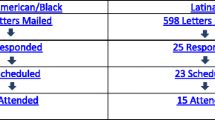Abstract
Cancer screening is a core component of family medicine but screening inequalities are well documented in Canada for foreign-born persons. Although people of Muslim faith and culture are the fastest growing immigrant population in Canada, there is little information in the literature about their cancer screening practices. Determining screening gaps could inform practice-based quality improvement initiatives. We conducted a retrospective chart review combining patient-level medical record data with self-reported religious affiliation to examine the relationship between religion and cancer screening in a large multi-site urban family practice. Religious affiliation was classified as Muslim, other affiliation, or atheist/no religious affiliation. 5311 patients were included in the study sample. Muslim patients were significantly less likely to prefer English for spoken communication than the other two groups, less likely to be Canadian-born, more likely to have a female family physician, and were over-represented in the lowest income quintile. Muslim women were most likely to be up-to-date on breast cancer screening (85.2 vs. 77.5 % for those with other religions vs. 69.5 % for those with no religious affiliation). There were no significant differences in cancer screening by physician sex. In this pilot study conducted within a primary care practice, we used self-reported data on religious affiliation to examine possible inequities in cancer screening and observed intriguing variations in screening by self-identified religious affiliation. Future efforts to collect and use similar patient-level data should incorporate non-official languages and intensively outreach to patients with less health system contact. Regardless, the family medicine context may be the ideal setting to collect and act on patient-level sociodemographic data such as religious affiliation.

Similar content being viewed by others
References
Cancer Care Ontario. Screening—CCO. http://www.cancercare.on.ca/pcs/screening/.
About the Ontario Breast Screening Program: Cancer Care Ontario. http://www.cancercare.on.ca/pcs/screening/breastscreening/OBSP/. Accessed 9 Feb 2016.
Cervical Cancer Screening: Cancer Care Ontario. http://www.cancercare.on.ca/pcs/screening/cervscreening/. Accessed 9 Feb 2016.
Lofters AK, Hwang SW, Moineddin R, Glazier RH. Cervical cancer screening among urban immigrants by region of origin: a population-based cohort study. Prev Med. 2010;51(6):509–16.
Lofters AK, Moineddin R, Hwang SW, Glazier RH. Predictors of low cervical cancer screening among immigrant women in Ontario, Canada. BMC Womens Health. 2011;11:20.
Vahabi M, Lofters A, Kumar M, Glazier RH. Breast cancer screening disparities among immigrant women by world region of origin: a population-based study in Ontario, Canada. Cancer Med. 2016;5(7):1670–86.
Padela AI, Peek M, Johnson-Agbakwu CE, Hosseinian Z, Curlin F. Associations between religion-related factors and cervical cancer screening among Muslims in greater chicago. J Low Genit Tract Dis. 2014;18(4):326–32.
Padela AI, Curlin FA. Religion and disparities: considering the influences of Islam on the health of American Muslims. J Relig Health. 2013;52(4):1333–45.
Padela AI, Gunter K, Killawi A, Heisler M. Religious values and healthcare accommodations: voices from the American Muslim community. J Gen Intern Med. 2012;27(6):708–15.
Matin M, LeBaron S. Attitudes toward cervical cancer screening among Muslim women: a pilot study. Women Health. 2004;39(3):63–77.
Underwood SM, Shaikha L, Bakr D. Veiled yet vulnerable. Breast cancer screening and the Muslim way of life. Cancer Pract. 1999;7(6):285–90.
Borkhoff CM, Saskin R, Rabeneck L, Baxter NN, Liu Y, Tinmouth J, et al. Disparities in receipt of screening tests for cancer, diabetes and high cholesterol in Ontario, Canada: a population-based study using area-based methods. Can J Public Health. 2013;104(4):e284–e90.
Fernandes KA, Sutradhar R, Borkhoff C, Baxter N, Lofters A, Rabeneck L, Tinmouth J, Paszat L. Cross-sectional small area variation study of cancer, glucose, and cholesterol screening in Ontario: data to motivate community and primary care strategies to improve participation. CMAJ Open. 2015;3(4):E373–81. doi:10.9778/cmajo.20140069.
Lofters AK, Ng R, Lobb R. Primary care physician characteristics associated with cancer screening: a retrospective cohort study in Ontario, Canada. Cancer Med. 2014;4(2):212–23.
Vahabi M, Lofters A, Kumar M, Glazier RH. Breast cancer screening disparities among urban immigrants: a population-based study in Ontario, Canada. BMC Public Health. 2015;15:679.
Vahabi M, Lofters A, Kumar M, Glazier R. Breast cancer screening disparities among immigrant women by world region of origin: A population-based study in Ontario, Canada. Cancer Med. 2016;5(7):1670–86.
2011 National Household Survey: Data Tables: Statistics Canada. http://www12.statcan.gc.ca/nhs-enm/2011/dp-pd/dt-td/Lp-eng.cfm?LANG=E&APATH=3&DETAIL=0&DIM=0&FL=A&FREE=0&GC=0&GID=0&GK=0&GRP=1&PID=0&PRID=0&PTYPE=105277&S=0&SHOWALL=0&SUB=0&Temporal=2013&THEME=95&VID=0&VNAMEE=&VNAMEF (2013).
Measuring Health Equity Toronto: Toronto Central Local Health Integration Network. http://torontohealthequity.ca (2016). Accessed 17 Feb 2016.
Screening Activity Report: Cancer Care Ontario. http://www.cancercare.on.ca/pcs/primcare/sar/ (2016).
Cervical Screening—CCO: Cancer Care Ontario. http://www.cancercare.on.ca/pcs/screening/cervscreening/ (2012).
Muslim Population By Country: Pew Forum Center. http://www.pewforum.org/2011/01/27/table-muslim-population-by-country/ (2011).
Padela AI, Murrar S, Adviento B, Liao C, Hosseinian Z, Peek M, et al. Associations between religion-related factors and breast cancer screening among American Muslims. J Immigr Minor Health. 2015;17(3):660–9.
Mitchell J, Lannin DR, Mathews HF, Swanson MS. Religious beliefs and breast cancer screening. J Womens Health (Larchmt). 2002;11(10):907–15.
Van Ness PH, Kasl SV, Jones BA. Are religious women more likely to have breast cancer screening? J Relig Health. 2002;41(4):333–46.
Allen JD, Leyva B, Torres AI, Ospino H, Tom L, Rustan S, et al. Religious beliefs and cancer screening behaviors among Catholic Latinos: implications for faith-based interventions. J Health Care Poor Underserved. 2014;25(2):503–26.
Salman KF. Health beliefs and practices related to cancer screening among Arab Muslim women in an urban community. Health Care Women Int. 2012;33(1):45–74.
Canadian primary care sentinel surveillance network. http://www.cpcssn.ca.
Acknowledgments
Dr. Aisha Lofters is supported by a Canadian Cancer Society Research Institute Career Development Award in Cancer Prevention and as a Clinician Scientist by the University of Toronto Department of Family & Community Medicine.
Author information
Authors and Affiliations
Corresponding author
Ethics declarations
Conflict of Interest
The authors have no conflicts of interest to declare.
Rights and permissions
About this article
Cite this article
Lofters, A., Slater, M. & Vahabi, M. Cancer Screening Among Patients Who Self-Identify as Muslim: Combining Self-Reported Data with Medical Records in a Family Practice Setting. J Immigrant Minority Health 20, 44–50 (2018). https://doi.org/10.1007/s10903-016-0508-x
Published:
Issue Date:
DOI: https://doi.org/10.1007/s10903-016-0508-x




